Professor Chengiah Rogers Ragaven: a life dedicated to social justice and academic excellence
Social activism
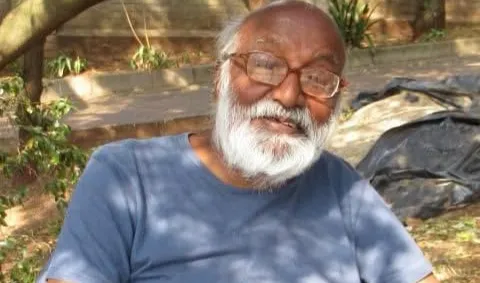
Professor Chengiah Rogers Ragaven.
Image: Supplied
PROFESSOR Chengiah Rogers Ragaven was born into a family in Reunion in South Durban in 1933.
He was an energetic activist, a life-long scholar, and a multi- and trans-disciplinary academic extra-ordinaire.
After initially starting out his adult life as a teacher - including stints at Louisiana Primary in Port Shepstone, Illovo Primary and Clairwood Boys.
He embarked on study at the then University of Natal - which had a separate campus (an old warehouse in Lancers Road) – so named the University of Natal Non-European (UNNE) section.
Here he became involved in student politics, and soon became part of the segregated Student Representative Council (SRC).
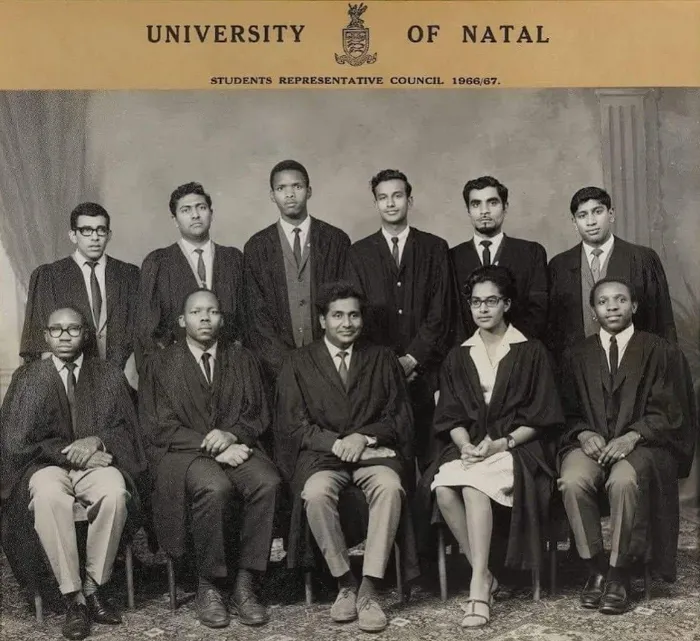
The UN Black SRC (UNB SRC 1966-67) committee. The UNNE has changed to UNB (Black replacing Non-European). Back from left: N Soni, DP (Paul) David, Bantu Steve Biko, SM (Sada) Naidoo, RP Juggath and KS Govender. Front from left, VS Ramasuvha, Ben Ngubane, Chengiah Rogers Ragaven, Rajes Pillay and L Mosendane.
Image: Supplied
He was a committee member in 1961 (under the leadership of Judge Thumba Pillay) and eventually became SRC president in 1966 - which committee included a young Steve Biko, Ben Ngubane, Paul David, Rajes Pillay and Sada Naidoo.
He also served as a vice-president of the National Union of South African Students (NUSAS) in the period 1966 – and interacted with then USA Presidential candidate Robert F Kennedy who visited South Africa in June 1966 to meet the banned ANC President Chief Albert Luthuli, and to speak at UCT and WITS campuses.
Post-this event, simmering differences over strategy to achieve a just society led to the break away from NUSAS to form SASO (SA Students Organization) under the leadership of Steve Biko.
Within these structures, Ragaven became acquainted with the likes of David Hemson, Ben Khoapa, Steve Biko, Saths Cooper, Strini Moodley, Rubin Phillip, Sam Moodley, Itumuleng Mosala, Barney Pityana, Mamphele Ramphele, Ronnie Green Thompson, etc – all who went on to have a significant role in the emancipation of the broader society especially the union movement, academia and civic society.
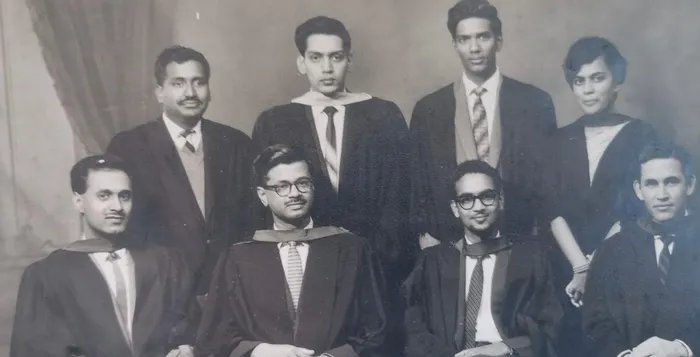
Professor Chengiah Rogers Ragaven, back left, first position at tertiary level - as a committee member of the then UNNE (University of Natal Non-European section) around 1961. It features Professor DS Rajah (Professor of Geography at UDW, VP at ML Sultan, seated second from left) and Judge Thumba Pillay (seated third from left) as chair.
Image: Supplied
The Apartheid State imposed a banning order in 1967 which effectively ended his academic pursuit. Consequently, after being further burdened with a “House Arrest order” which prevented him continuing his studies and restricted him to his home.
In a bold move, he chose to leave the country in 1968 on an exit permit (meaning he couldn’t return to South Africa), a move that devasted his close knot family.
He arrived in London and was warmly welcomed by the Dass family - also from Isipingo.
He obtained multiple qualifications from the Universities of London, Oxford, Cambridge and Sussex.
He simultaneously pursued his commitment for justice whilst in the United Kingdom (1968-1982, where he mobilized international support for the liberation struggle, and later - from 1982 - in Canada for the African National Congress (ANC) as well as other advocacy initiatives against injustice.
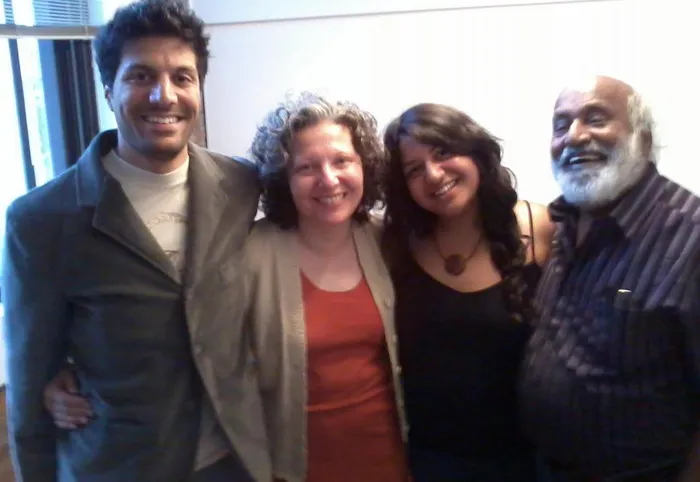
Professor Chengiah Rogers Ragaven and Professor Laurel Baldwin Ragaven with their children Avikhael Shankara and Shanthi Samara.
Image: Supplied
His career spanning over 70 years across 3 continents in the public domain - stretching from Durban.
Into a forced exile in 1968 he went to London. He had a brief interlude teaching in Libya 1977-78, and then went to Canada in 1982, where he served as a Professor of Sociology at Concordia University in Montreal.
He returned to Durban in 1993 (ML Sultan Technikon and Technikon Natal), then went to Cape Town (as a parliamentary researcher 1998-2000).
Between 2000 and 2013 he was in Connecticut and was finally back to Johannesburg in 2013.
His life was a rich tapestry of continual activity predicated on conscientising the public about social activism and equitable justice covering inter-alia human rights, feminism and gender equity, student-centric teaching and learning, environmental issues, de-colonialism, societal de-stratification, sensitizing the nuances of patriarchal societies, a vigorous exposition of the fallacies of religious doctrines, gluttonous resource extraction from the third world countries, the positive and negative effects of globalization, etc.
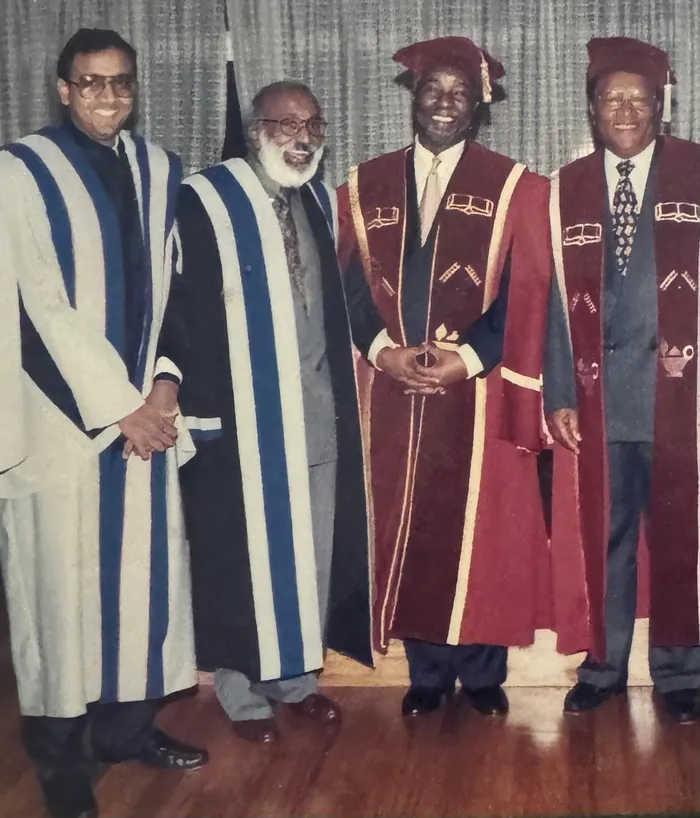
At then deputy president Thabo Mbeki's installation as Chancellor of Technikon Natal - July 1996. From left: Harrikrishna Narismulu, Chengiah Rogers Ragaven, Thabo Mbeki and Professor Ben Khoapa (Vice Chancellor and Principal of Technikon Natal).
Image: Supplied
His personal history, dynamic personality, and unwavering commitment to social justice were imbued in his teaching and inspired generations of students and colleagues.
He was a prolific advocate for social justice and was able to raise not just funds but convert ordinary folk with a passing interest into active solidarity with the various causes – most notably involving gender parity, social inequity, racism and off course support for the anti-apartheid struggle.
An intellectual of remarkable breadth, he was educated at the institutions across 3 countries; and has multiple qualifications – the last being a Masters in Theology in 1998.
He was a great example of “lifelong learning”. He was the perennial student and truly a polymath. He could hold a conversation on virtually any topic.
His political consciousness, forged in apartheid South Africa, shaped his teaching and research throughout his academic career. His endeavours have left a distinctive mark on not just the students who took his classes, the folk who listened to his electrifying speeches at the anti-apartheid rallies, etc exposed multi-sectoral inequities, and respect people, across geographies
After the fall of apartheid, Nelson Mandela called for the return of exiles to help rebuild the country. Sadly, the call was inadequately resourced and administered for many returnees who gave up much to return to the land of their birth. Further, the lack of acknowledgement by the ANC for his sterling contributions leaves much to be desired.
Professor Ragaven passed away last week at the age of 92 leaving behind a legacy of courage, conviction, and compassion. His life’s journey from a student activist, an exile, a serious public intellectual; to an educator and moral leader stands as a testament to the enduring power of resilience and principled leadership. Tribute must be paid to his wife of almost 50 years – Professor Laurel Baldwin Ragaven – a formidable social activist in her
own right. She is a Professor of Family Medicine at Wits University, who gave Ragaven massive support to chase his dreams.
He leaves behind a son Avikhael Shankara and a daughter Shanthi Samara
Professor Chengiah Rogers Ragaven was cremated at the Clare Estate Crematorium on Sunday.
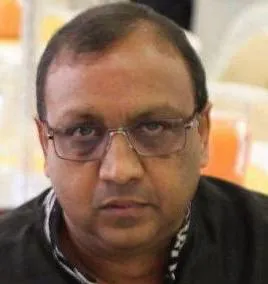
Harrikrishna A Narismulu
Image: Supplied
Harrikrishna Anandha Narismulu trained as an Analytical Chemist (SAPREF, Sterling Winthrop Drug, Technikon Natal). He became the first black member of the then Technikon Natal Governing Council in 1991; and served as Head of Public Affairs. In January 2003, he founded “Innopraxis Hire Intelligence” – a niche Consultancy that facilitates the entry of multi-nationals companies int Africa, promotes education linkages, develops income-generation and fund-raising for institutions and NGO’s. Currently, as a social entrepreneur – he is managing a Sub-Acute Hospital and a Physical rehabilitation Centre in Chatsworth that aims to serve the indigent.
** The views expressed do not necessarily reflect the views of IOL or Independent Media.